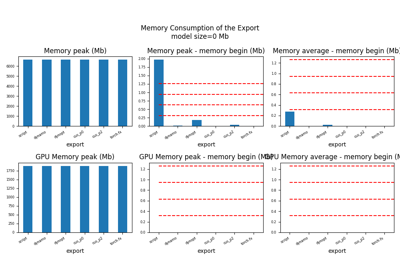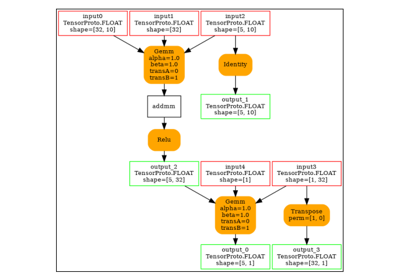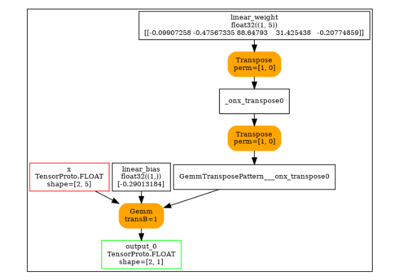Note
Go to the end to download the full example code.
201: Use torch to export a scikit-learn model into ONNX¶
When sklearn-onnx is missing a converter, torch can be used
to write it. We use sklearn.impute.KNNImputer as an example.
The first step is to rewrite the scikit-learn model with torch functions.
The code is then refactored and split into submodules to be able
to bypass some pieces torch.export.export() cannot process.
torch implementation of nan_euclidean_distances¶
Let’s start with a simple case, a pairwise distance.
See sklearn.metrics.pairwise.nan_euclidean_distances().
Module¶
import contextlib
import io
import logging
import math
import numbers
import warnings
import numpy as np
import onnx
import sklearn
import torch
import onnxruntime
from onnx_diagnostic.helpers import max_diff
from onnx_diagnostic.helpers.onnx_helper import pretty_onnx
from experimental_experiment.reference import ExtendedReferenceEvaluator
from experimental_experiment.skl.helpers import flatnonzero, _get_weights
from experimental_experiment.torch_interpreter import make_undefined_dimension
from onnx_diagnostic.torch_export_patches import torch_export_patches
from experimental_experiment.torch_interpreter.piece_by_piece import (
trace_execution_piece_by_piece,
CustomOpStrategy,
)
from experimental_experiment.xbuilder.reverse_graph_builder import to_graph_builder_code
class NanEuclidean(torch.nn.Module):
"""Implements :func:`sklearn.metrics.pairwise.nan_euclidean_distances`."""
def __init__(self, squared=False, copy=True):
super().__init__()
self.squared = squared
self.copy = copy
def forward(self, X, Y):
X = X.clone()
Y = Y.to(X.dtype).clone()
missing_X = torch.isnan(X)
missing_Y = torch.isnan(Y)
# set missing values to zero
X[missing_X] = 0
Y[missing_Y] = 0
# Adjust distances for missing values
XX = X * X
YY = Y * Y
distances = -2 * X @ Y.T + XX.sum(1, keepdim=True) + YY.sum(1, keepdim=True).T
distances -= XX @ missing_Y.to(X.dtype).T
distances -= missing_X.to(X.dtype) @ YY.T
distances = torch.clip(distances, 0, None)
present_X = 1 - missing_X.to(X.dtype)
present_Y = ~missing_Y
present_count = present_X @ present_Y.to(X.dtype).T
distances[present_count == 0] = torch.nan
# avoid divide by zero
present_count = torch.maximum(torch.tensor([1], dtype=present_count.dtype), present_count)
distances /= present_count
distances *= X.shape[1]
if not self.squared:
distances = distances.sqrt()
return distances
Validation¶
def get_xy(sizex=5, sizey=3, col=3, n_nans=None):
X = torch.randn((sizex, col))
Y = torch.randn((sizey, col))
i_nans = 0
for i in range(sizex):
X[i, i % X.shape[1]] = torch.nan
i_nans += 1
if n_nans and n_nans >= i_nans:
break
X[i, (i + 1) % X.shape[1]] = torch.nan
i_nans += 1
if n_nans and n_nans >= i_nans:
break
i_nans = 0
for i in range(sizey):
Y[(i + 1) % sizey, i % Y.shape[1]] = torch.nan
i_nans += 1
if n_nans and n_nans >= i_nans:
break
Y[(i + 1) % sizey, (i + 1) % Y.shape[1]] = torch.nan
i_nans += 1
if n_nans and n_nans >= i_nans:
break
return X, Y
X, Y = get_xy()
model = NanEuclidean()
d1 = sklearn.metrics.nan_euclidean_distances(X.numpy(), Y.numpy())
d2 = model(X, Y)
print(f"discrepancies: {max_diff(d1, d2)}")
discrepancies: {'abs': 0.0, 'rel': 0.0, 'sum': 0.0, 'n': 15.0, 'dnan': 0.0, 'argm': (0, 0), 'dev': 0}
torch implementation of KNNImputer¶
See sklearn.impute.KNNImputer.
The code is split into several torch.nn.Module
and refactored to avoid control flow.
Module and sub modules¶
def _get_mask(X, value_to_mask):
return (
torch.isnan(X)
if ( # sklearn.utils._missing.is_scalar_nan(value_to_mask)
not isinstance(value_to_mask, numbers.Integral)
and isinstance(value_to_mask, numbers.Real)
and math.isnan(value_to_mask)
)
else (value_to_mask == X)
)
class SubWeightMatrix(torch.nn.Module):
def __init__(self, weights):
super().__init__()
self.weights = weights
def forward(self, donors_dist):
weight_matrix = _get_weights(donors_dist, self.weights)
if weight_matrix is not None:
weight_matrix = weight_matrix.clone()
weight_matrix[torch.isnan(weight_matrix)] = 0.0
else:
weight_matrix = torch.ones_like(donors_dist)
weight_matrix[torch.isnan(donors_dist)] = 0.0
return weight_matrix
class SubDonorsIdx(torch.nn.Module):
def forward(self, dist_pot_donors, n_neighbors):
xn = torch.nan_to_num(dist_pot_donors, nan=1.0e10)
tk = torch.topk(xn, n_neighbors, dim=1, largest=False, sorted=True)
return tk.indices, tk.values
class MakeNewWeights(torch.nn.Module):
def forward(self, donors_mask, donors, weight_matrix):
return donors_mask.to(donors.dtype) * weight_matrix.to(donors.dtype)
class CalcImpute(torch.nn.Module):
"""Implements :meth:`sklearn.impute.KNNImputer._calc_impute`."""
def __init__(self, weights):
super().__init__()
self._weights = SubWeightMatrix(weights)
self._donors_idx = SubDonorsIdx()
self._make_new_neights = MakeNewWeights()
def _calc_impute(self, dist_pot_donors, n_neighbors, fit_X_col, mask_fit_X_col):
donors_idx, donors_dist = self._donors_idx(dist_pot_donors, n_neighbors)
weight_matrix = self._weights(donors_dist)
# Retrieve donor values and calculate kNN average
donors = fit_X_col.take(donors_idx)
donors_mask = torch.tensor([1], dtype=donors_idx.dtype) - (
mask_fit_X_col.take(donors_idx)
).to(donors_idx.dtype)
new_weights = self._make_new_neights(donors_mask, donors, weight_matrix)
weights_sum = new_weights.sum(axis=1, keepdim=True)
div = torch.where(
weights_sum == 0, torch.tensor([1], dtype=weights_sum.dtype), weights_sum
)
res = (donors * new_weights).sum(axis=1, keepdim=True) / div
return res.squeeze(dim=1).to(dist_pot_donors.dtype)
def forward(self, dist_pot_donors, n_neighbors, fit_X_col, mask_fit_X_col):
return self._calc_impute(dist_pot_donors, n_neighbors, fit_X_col, mask_fit_X_col)
class ColProcessorAllNan(torch.nn.Module):
def __init__(self, col: int):
super().__init__()
self.col = col
def forward(
self,
X,
dist_subset,
mask_fit_X,
_fit_X,
receivers_idx,
all_nan_receivers_idx,
all_nan_dist_mask,
dist_chunk,
dist_idx_map,
potential_donors_idx,
):
col = self.col
X = X.clone()
mask_ = (~mask_fit_X[:, col]).to(_fit_X.dtype)
mask_sum = mask_.to(X.dtype).sum()
col_sum = (_fit_X[mask_ == 1, col]).sum().to(X.dtype)
div = torch.where(mask_sum > 0, mask_sum, torch.tensor([1], dtype=mask_sum.dtype))
X[all_nan_receivers_idx, col] = col_sum / div
# receivers with at least one defined distance
receivers_idx = receivers_idx[~all_nan_dist_mask]
dist_subset = dist_chunk[dist_idx_map[receivers_idx]][:, potential_donors_idx]
return X, dist_subset, receivers_idx
class ColProcessorIdentity(torch.nn.Module):
def forward(
self,
X,
dist_subset,
mask_fit_X,
_fit_X,
receivers_idx,
all_nan_receivers_idx,
all_nan_dist_mask,
dist_chunk,
dist_idx_map,
potential_donors_idx,
):
# .clone() not efficient but torch.cond does not like simple return
return (
X.contiguous(),
dist_subset.contiguous(),
receivers_idx.contiguous(),
)
class ColProcessorCond(torch.nn.Module):
def __init__(self, col: int):
super().__init__()
self.col = col
self._all_nan = ColProcessorAllNan(col)
self._identity = ColProcessorIdentity()
def forward(
self,
X,
dist_subset,
mask_fit_X,
_fit_X,
receivers_idx,
all_nan_receivers_idx,
all_nan_dist_mask,
dist_chunk,
dist_idx_map,
potential_donors_idx,
):
X, dist_subset, receivers_idx = torch.cond(
all_nan_receivers_idx.numel() > 0,
self._all_nan,
self._identity,
[
X,
dist_subset,
mask_fit_X,
_fit_X,
receivers_idx,
all_nan_receivers_idx,
all_nan_dist_mask,
dist_chunk,
dist_idx_map,
potential_donors_idx,
],
)
return X.contiguous(), dist_subset.contiguous(), receivers_idx.contiguous()
class ColProcessor(torch.nn.Module):
"""Processes one column (= one feature)."""
def __init__(self, col, n_neighbors, weights):
super().__init__()
self._calc_impute = CalcImpute(weights)
self._col_cond = ColProcessorCond(col)
self.col = col
self.n_neighbors = n_neighbors
def process_one_col(
self,
X,
dist_chunk,
non_missing_fix_X,
mask_fit_X,
dist_idx_map,
mask,
row_missing_idx,
_fit_X,
):
col = self.col
X = X.clone()
row_missing_chunk = row_missing_idx
col_mask = mask[row_missing_chunk, col]
potential_donors_idx = torch.nonzero(non_missing_fix_X[:, col], as_tuple=True)[0]
# receivers_idx are indices in X
receivers_idx = row_missing_chunk[flatnonzero(col_mask)]
# distances for samples that needed imputation for column
dist_subset = dist_chunk[dist_idx_map[receivers_idx]][:, potential_donors_idx]
# receivers with all nan distances impute with mean
all_nan_dist_mask = torch.isnan(dist_subset).all(axis=1)
all_nan_receivers_idx = receivers_idx[all_nan_dist_mask]
# when all_nan_receivers_idx is not empty (training set is small)
# ... if all_nan_receivers_idx.size > 0:
# # onnxruntime does not like this part when it is empty
# mask_ = (~mask_fit_X[:, col]).to(_fit_X.dtype)
# mask_sum = mask_.to(X.dtype).sum()
#
# col_sum = (_fit_X[mask_ == 1, col]).sum().to(X.dtype)
# div = torch.where(mask_sum > 0, mask_sum, torch.tensor([1], dtype=mask_sum.dtype))
# X[all_nan_receivers_idx, col] = col_sum / div
#
# # receivers with at least one defined distance
# receivers_idx = receivers_idx[~all_nan_dist_mask]
# dist_subset = dist_chunk[dist_idx_map[receivers_idx]][:, potential_donors_idx]
# else
# ... identity
X, dist_subset, receivers_idx = self._col_cond(
X,
dist_subset,
mask_fit_X,
_fit_X,
receivers_idx,
all_nan_receivers_idx,
all_nan_dist_mask,
dist_chunk,
dist_idx_map,
potential_donors_idx,
)
# when all_nan_receivers_idx is not empty (training set is big)
tn = torch.tensor(self.n_neighbors)
n_neighbors = torch.where(
tn < potential_donors_idx.shape[0], tn, potential_donors_idx.shape[0]
)
# to make sure n_neighbors > 0
n_neighbors = torch.where(
n_neighbors <= 0, torch.tensor([1], dtype=n_neighbors.dtype), n_neighbors
)
value = self._calc_impute(
dist_subset,
n_neighbors,
_fit_X[potential_donors_idx, col],
mask_fit_X[potential_donors_idx, col],
)
X[receivers_idx, col] = value.to(X.dtype)
return X
def forward(
self,
X,
dist_chunk,
non_missing_fix_X,
mask_fit_X,
dist_idx_map,
mask,
row_missing_idx,
_fit_X,
):
return self.process_one_col(
X,
dist_chunk,
non_missing_fix_X,
mask_fit_X,
dist_idx_map,
mask,
row_missing_idx,
_fit_X,
)
class MakeDictIdxMap(torch.nn.Module):
def forward(self, X, row_missing_idx):
dist_idx_map = torch.zeros(X.shape[0], dtype=int)
dist_idx_map[row_missing_idx] = torch.arange(row_missing_idx.shape[0])
return dist_idx_map
class TorchKNNImputer(torch.nn.Module):
def __init__(self, knn_imputer):
super().__init__()
assert (
knn_imputer.metric == "nan_euclidean"
), f"Not implemented for metric={knn_imputer.metric!r}"
self.dist = NanEuclidean()
cols = []
for col in range(knn_imputer._fit_X.shape[1]):
cols.append(ColProcessor(col, knn_imputer.n_neighbors, knn_imputer.weights))
self.columns = torch.nn.ModuleList(cols)
# refactoring
self._make_dict_idx_map = MakeDictIdxMap()
# knn imputer
self.missing_values = knn_imputer.missing_values
self.n_neighbors = knn_imputer.n_neighbors
self.weights = knn_imputer.weights
self.metric = knn_imputer.metric
self.keep_empty_features = knn_imputer.keep_empty_features
self.add_indicator = knn_imputer.add_indicator
# results of fitting
self.indicator_ = knn_imputer.indicator_
# The training results.
# self._fit_X = torch.from_numpy(knn_imputer._fit_X.astype(np.float32))
# self._mask_fit_X = torch.from_numpy(knn_imputer._mask_fit_X)
# self._valid_mask = torch.from_numpy(knn_imputer._valid_mask)
def _transform_indicator(self, X):
if self.add_indicator:
if not hasattr(self, "indicator_"):
raise ValueError("Make sure to call _fit_indicator before _transform_indicator")
raise NotImplementedError(type(self.indicator_))
# return self.indicator_.transform(X)
return None
def _concatenate_indicator(self, X_imputed, X_indicator):
if not self.add_indicator:
return X_imputed
if X_indicator is None:
raise ValueError(
"Data from the missing indicator are not provided. Call "
"_fit_indicator and _transform_indicator in the imputer "
"implementation."
)
return torch.cat([X_imputed, X_indicator], dim=0)
def transform(self, mask_fit_X, _valid_mask, _fit_X, X):
X = X.clone()
mask = _get_mask(X, self.missing_values)
X_indicator = self._transform_indicator(mask)
row_missing_idx = flatnonzero(mask[:, _valid_mask].any(axis=1))
non_missing_fix_X = torch.logical_not(mask_fit_X)
# Maps from indices from X to indices in dist matrix
dist_idx_map = self._make_dict_idx_map(X, row_missing_idx)
# process in fixed-memory chunks
pairwise_distances = self.dist(X[row_missing_idx, :], _fit_X)
# The export unfold the loop as it depends on the number of features.
# Fixed in this case.
for col_processor in self.columns:
X = col_processor(
X,
pairwise_distances,
non_missing_fix_X,
mask_fit_X,
dist_idx_map,
mask,
row_missing_idx,
_fit_X,
)
if self.keep_empty_features:
Xc = X.clone()
Xc[:, ~_valid_mask] = 0
else:
Xc = X[:, _valid_mask]
return self._concatenate_indicator(Xc, X_indicator)
def forward(self, _mask_fit_X, _valid_mask, _fit_X, X):
return self.transform(_mask_fit_X, _valid_mask, _fit_X, X)
Validation¶
We need to do that with different sizes of training set.
def validate(size, sizey, col=3, n_nans=None):
X, Y = get_xy(size, sizey, col, n_nans)
knn_imputer = sklearn.impute.KNNImputer(n_neighbors=3)
knn_imputer.fit(X)
model = TorchKNNImputer(knn_imputer)
p1 = knn_imputer.transform(Y)
p2 = model.transform(
torch.from_numpy(knn_imputer._mask_fit_X),
torch.from_numpy(knn_imputer._valid_mask),
torch.from_numpy(knn_imputer._fit_X.astype(np.float32)),
Y,
)
d = max_diff(p1, p2)
assert d["abs"] < 1e-5, f"Discrepancies for size={size} and sizey={sizey}, d={d}"
print(f"knn discrepancies for size={size}: {d}")
p1 = knn_imputer.transform(Y[1:2])
p2 = model.transform(
torch.from_numpy(knn_imputer._mask_fit_X),
torch.from_numpy(knn_imputer._valid_mask),
torch.from_numpy(knn_imputer._fit_X.astype(np.float32)),
Y[1:2],
)
d = max_diff(p1, p2)
assert d["abs"] < 1e-5, f"Discrepancies for size={size} and sizey={sizey}, d={d}"
print(f"knn discrepancies for size={size}: {d}")
return knn_imputer, Y
knn5, Y10 = validate(5, 10)
knn50, Y40 = validate(50, 40)
knn1, Y1 = validate(10, 10, n_nans=1)
knn11, Y11 = validate(11, 11, n_nans=1)
knn discrepancies for size=5: {'abs': 5.587935447692871e-09, 'rel': 2.6445300481704556e-08, 'sum': 6.146728992462158e-08, 'n': 30.0, 'dnan': 0.0, 'argm': (0, 0), 'dev': 0}
knn discrepancies for size=5: {'abs': 5.587935447692871e-09, 'rel': 2.6445300481704556e-08, 'sum': 5.587935447692871e-09, 'n': 3.0, 'dnan': 0.0, 'argm': (0, 0), 'dev': 0}
knn discrepancies for size=50: {'abs': 2.6296166799610887e-08, 'rel': 4.2841166039137845e-07, 'sum': 1.4117686073789049e-06, 'n': 120.0, 'dnan': 0.0, 'argm': (0, 0), 'dev': 0}
knn discrepancies for size=50: {'abs': 2.6296166799610887e-08, 'rel': 6.958343624659891e-08, 'sum': 2.780956598336104e-08, 'n': 3.0, 'dnan': 0.0, 'argm': (0, 0), 'dev': 0}
knn discrepancies for size=10: {'abs': 4.967053740534411e-09, 'rel': 2.7756723897997384e-08, 'sum': 4.967053740534411e-09, 'n': 30.0, 'dnan': 0.0, 'argm': (1, 0), 'dev': 0}
knn discrepancies for size=10: {'abs': 4.967053740534411e-09, 'rel': 2.7756723897997384e-08, 'sum': 4.967053740534411e-09, 'n': 3.0, 'dnan': 0.0, 'argm': (0, 0), 'dev': 0}
knn discrepancies for size=11: {'abs': 9.93410742555767e-09, 'rel': 1.0679934090211538e-08, 'sum': 9.93410742555767e-09, 'n': 33.0, 'dnan': 0.0, 'argm': (1, 0), 'dev': 0}
knn discrepancies for size=11: {'abs': 9.93410742555767e-09, 'rel': 1.0679934090211538e-08, 'sum': 9.93410742555767e-09, 'n': 3.0, 'dnan': 0.0, 'argm': (0, 0), 'dev': 0}
Export to ONNX¶
The module cannot be exported as is because one operator torch.topk()
expects a fixed number of neighbour but the model makes it variable.
This is case not supported by torch.export.export().
We need to isolate that part before exporting the model.
It is done by replacing it with a custom op.
This is automatically done by function
trace_execution_piece_by_piece.
First step, we create two sets of inputs. A function will use this to infer the dynamic shapes.
First step: tracing intermediate outputs¶
used = [(knn50, Y40), (knn5, Y10), (knn1, Y1), (knn11, Y11)]
inputs = [
(
(
torch.from_numpy(knn._mask_fit_X),
torch.from_numpy(knn._valid_mask),
torch.from_numpy(knn._fit_X.astype(np.float32)),
y,
),
{},
)
for knn, y in used
]
Then we trace the execution to capture every input and output of every submodule.
The model implementation was refactored to introduce many tiny one and get
a fine-grained evaluation of the exportability.
We track messages such as -needs-more-inputs or -no-input.
If any, we must provide the tracer more input to make sure
every submodule receives enough data to guess dynamic shapes and export.
When the model has control flow, we need more data to make sure every
piece is used.
trace = trace_execution_piece_by_piece(TorchKNNImputer(knn5), inputs, verbose=0)
pretty = trace.get_export_report()
print(pretty)
__main__ TorchKNNImputer <OK-4i-0>
..dist NanEuclidean <OK-4i-0>
..columns[0] ColProcessor <OK-4i-0>
...._calc_impute CalcImpute <OK-4i-2>
......_weights SubWeightMatrix <OK-4i-2>
......_donors_idx SubDonorsIdx <OK-4i-2>
......_make_new_neights MakeNewWeights <OK-4i-2>
...._col_cond ColProcessorCond <OK-4i-0>
......_all_nan ColProcessorAllNan <OK-2i-0>
......_identity ColProcessorIdentity <OK-2i-may-need-more>
..columns[1] ColProcessor <OK-4i-0>
...._calc_impute CalcImpute <OK-4i-may-need-more>
......_weights SubWeightMatrix <OK-4i-may-need-more>
......_donors_idx SubDonorsIdx <OK-4i-may-need-more>
......_make_new_neights MakeNewWeights <OK-4i-may-need-more>
...._col_cond ColProcessorCond <OK-4i-0>
......_all_nan ColProcessorAllNan <OK-2i-0>
......_identity ColProcessorIdentity <OK-2i-may-need-more>
..columns[2] ColProcessor <OK-4i-0>
...._calc_impute CalcImpute <OK-4i-may-need-more>
......_weights SubWeightMatrix <OK-4i-may-need-more>
......_donors_idx SubDonorsIdx <OK-4i-may-need-more>
......_make_new_neights MakeNewWeights <OK-4i-may-need-more>
...._col_cond ColProcessorCond <OK-4i-0>
......_all_nan ColProcessorAllNan <OK-2i-0>
......_identity ColProcessorIdentity <OK-2i-may-need-more>
.._make_dict_idx_map MakeDictIdxMap <OK-4i-0>
We need more so let’s add more.
def rotate(inputs, col=3):
if isinstance(inputs, torch.Tensor):
if len(inputs.shape) == 2 and inputs.shape[1] == 3:
return torch.cat([inputs[:, 1:], inputs[:, :1]], axis=1)
if len(inputs.shape) == 1 and inputs.shape[0] == 3:
return torch.cat([inputs[1:], inputs[:1]], axis=0)
return inputs
if isinstance(inputs, tuple):
return tuple(rotate(i, col=col) for i in inputs)
if isinstance(inputs, list):
return [rotate(i, col=col) for i in inputs]
if isinstance(inputs, dict):
return {k: rotate(v, col=col) for k, v in inputs.items()}
raise TypeError(f"Unexpected type {type(inputs)}")
inputs = [*inputs, *rotate(inputs), *rotate(rotate(inputs))]
Let’s try again.
print("---------")
trace = trace_execution_piece_by_piece(TorchKNNImputer(knn5), inputs, verbose=0)
pretty = trace.get_export_report()
print(pretty)
---------
__main__ TorchKNNImputer <OK-12i-0>
..dist NanEuclidean <OK-12i-0>
..columns[0] ColProcessor <OK-12i-0>
...._calc_impute CalcImpute <OK-12i-2>
......_weights SubWeightMatrix <OK-12i-2>
......_donors_idx SubDonorsIdx <OK-12i-2>
......_make_new_neights MakeNewWeights <OK-12i-2>
...._col_cond ColProcessorCond <OK-12i-0>
......_all_nan ColProcessorAllNan <OK-6i-0>
......_identity ColProcessorIdentity <OK-6i-may-need-more>
..columns[1] ColProcessor <OK-12i-0>
...._calc_impute CalcImpute <OK-12i-10>
......_weights SubWeightMatrix <OK-12i-10>
......_donors_idx SubDonorsIdx <OK-12i-10>
......_make_new_neights MakeNewWeights <OK-12i-10>
...._col_cond ColProcessorCond <OK-12i-0>
......_all_nan ColProcessorAllNan <OK-6i-0>
......_identity ColProcessorIdentity <OK-6i-may-need-more>
..columns[2] ColProcessor <OK-12i-0>
...._calc_impute CalcImpute <OK-12i-6>
......_weights SubWeightMatrix <OK-12i-6>
......_donors_idx SubDonorsIdx <OK-12i-6>
......_make_new_neights MakeNewWeights <OK-12i-6>
...._col_cond ColProcessorCond <OK-12i-0>
......_all_nan ColProcessorAllNan <OK-6i-0>
......_identity ColProcessorIdentity <OK-6i-may-need-more>
.._make_dict_idx_map MakeDictIdxMap <OK-12i-0>
The dynamic shapes for the whole model:
print("dynamic shapes:")
print(trace.guess_dynamic_shapes())
dynamic shapes:
(({0: DimHint(DYNAMIC)}, {}, {0: DimHint(DYNAMIC)}, {0: DimHint(DYNAMIC)}), {})
The method try_export cannot infer all links between input shapes and output shapes
for every submodule. The following function fills this gap.
shape_functions = {
"NanEuclidean": {
0: lambda *args, **kwargs: torch.empty(
(args[0].shape[0], args[1].shape[0]), dtype=args[0].dtype
)
},
"CalcImpute": {
0: lambda *args, **kwargs: torch.empty((args[0].shape[0],), dtype=args[0].dtype)
},
"SubDonorsIdx": {
0: lambda *args, **kwargs: torch.empty(
(
make_undefined_dimension(111111), # args[0].shape[0]),
make_undefined_dimension(min(args[0].shape[1], knn5.n_neighbors)),
),
dtype=args[0].dtype,
),
1: lambda *args, **kwargs: torch.empty(
(
make_undefined_dimension(111111), # args[0].shape[0]),
make_undefined_dimension(min(args[0].shape[1], knn5.n_neighbors)),
),
dtype=torch.float32,
),
},
"MakeDictIdxMap": {
0: lambda *args, **kwargs: torch.empty((args[0].shape[0],), dtype=args[1].dtype),
},
"ColProcessorCond": {
0: lambda *args, **kwargs: torch.empty(args[0], dtype=args[0].dtype),
1: lambda *args, **kwargs: torch.empty(
make_undefined_dimension(0), args[1].shape[1], dtype=args[0].dtype
),
2: lambda *args, **kwargs: torch.empty(
(make_undefined_dimension(0),), dtype=args[0].dtype
),
},
}
Then we we try to export piece by piece.
We capture the standard output to avoid being overwhelmed
and we use function
onnx_diagnostic.torch_export_patches.torch_export_patches()
to skip some errors with shape checking made by torch.
logging.disable(logging.CRITICAL)
with contextlib.redirect_stderr(io.StringIO()), torch_export_patches():
ep = trace.try_export(
exporter="fx",
use_dynamic_shapes=True,
exporter_kwargs=dict(strict=False),
replace_by_custom_op=CustomOpStrategy.LOCAL,
verbose=0,
shape_functions=shape_functions,
quiet=1,
)
assert ep.status in (
ep.status.OK,
ep.status.OK_CHILDC,
), f"FAIL: {ep}\n-- report --\n{trace.get_export_report()}"
print(trace.get_export_report())
__main__ TorchKNNImputer OK_CHILDC -- ExportedProgram
..dist NanEuclidean OK -- ExportedProgram
..columns[0] ColProcessor OK_CHILDC -- ExportedProgram
...._calc_impute CalcImpute FAIL_CHILDC -- step=, reason='Guard failed: dist_pot_donors.size()[0] == 1'
......_weights SubWeightMatrix FAIL -- step=, reason='Guard failed: donors_dist.size()[0] == 1'
......_donors_idx SubDonorsIdx FAIL -- step=, reason='Guard failed: dist_pot_donors.size()[0] == 1'
......_make_new_neights MakeNewWeights FAIL -- step=, reason='Guard failed: donors_mask.size()[0] == 1'
...._col_cond ColProcessorCond FAIL_CHILDC -- step=EXPORT, reason='Dynamo failed to run FX node with fake tensors: call_function cond(*(s2, GraphModule(), GraphModule(...'
......_all_nan ColProcessorAllNan OK -- ExportedProgram
......_identity ColProcessorIdentity FAIL -- step=, reason='Guard failed: dist_subset.size()[0] == 1'
..columns[1] ColProcessor OK_CHILDC -- ExportedProgram
...._calc_impute CalcImpute FAIL_CHILDC -- step=, reason='Guard failed: dist_pot_donors.size()[0] == 1'
......_weights SubWeightMatrix FAIL -- step=, reason='Guard failed: donors_dist.size()[0] == 1'
......_donors_idx SubDonorsIdx FAIL -- step=, reason='Guard failed: dist_pot_donors.size()[0] == 1'
......_make_new_neights MakeNewWeights FAIL -- step=, reason='Guard failed: donors_mask.size()[0] == 1'
...._col_cond ColProcessorCond FAIL_CHILDC -- step=EXPORT, reason='Dynamo failed to run FX node with fake tensors: call_function cond(*(s2, GraphModule(), GraphModule(...'
......_all_nan ColProcessorAllNan OK -- ExportedProgram
......_identity ColProcessorIdentity FAIL -- step=, reason='Guard failed: dist_subset.size()[0] == 0'
..columns[2] ColProcessor OK_CHILDC -- ExportedProgram
...._calc_impute CalcImpute FAIL_CHILDC -- step=, reason='Guard failed: dist_pot_donors.size()[0] == 1'
......_weights SubWeightMatrix FAIL -- step=, reason='Guard failed: donors_dist.size()[0] == 1'
......_donors_idx SubDonorsIdx FAIL -- step=, reason='Guard failed: dist_pot_donors.size()[0] == 1'
......_make_new_neights MakeNewWeights FAIL -- step=, reason='Guard failed: donors_mask.size()[0] == 1'
...._col_cond ColProcessorCond FAIL_CHILDC -- step=EXPORT, reason='Dynamo failed to run FX node with fake tensors: call_function cond(*(s2, GraphModule(), GraphModule(...'
......_all_nan ColProcessorAllNan OK -- ExportedProgram
......_identity ColProcessorIdentity FAIL -- step=, reason='Guard failed: dist_subset.size()[0] == 0'
.._make_dict_idx_map MakeDictIdxMap OK -- ExportedProgram
OK means the module is exportable. OK_CHILDC means the module
can be exported after its submodules are replaced by custom ops.
It works except for the topk function. FAIL means
the submodule cannot be exported at all but that
module is simple enough and its ONNX conversion can be provided.
Final step¶
We first start by running the decompositions on every exported program.
with warnings.catch_warnings():
warnings.simplefilter("ignore")
for t in trace:
if t.exporter_status.exported is None:
print(f"[run_decompositions] {t.dot_name} - skipped")
continue
print(f"[run_decompositions] {t.dot_name}")
t.exporter_status.exported = t.exporter_status.exported.run_decompositions({})
[run_decompositions] M:__main__-TorchKNNImputer
[run_decompositions] .. M:dist-NanEuclidean
[run_decompositions] .. M:columns[0]-ColProcessor
[run_decompositions] .... M:_calc_impute-CalcImpute
[run_decompositions] ...... M:_weights-SubWeightMatrix
[run_decompositions] ...... M:_donors_idx-SubDonorsIdx
[run_decompositions] ...... M:_make_new_neights-MakeNewWeights
[run_decompositions] .... M:_col_cond-ColProcessorCond - skipped
[run_decompositions] ...... M:_all_nan-ColProcessorAllNan
[run_decompositions] ...... M:_identity-ColProcessorIdentity
[run_decompositions] .. M:columns[1]-ColProcessor
[run_decompositions] .... M:_calc_impute-CalcImpute
[run_decompositions] ...... M:_weights-SubWeightMatrix
[run_decompositions] ...... M:_donors_idx-SubDonorsIdx
[run_decompositions] ...... M:_make_new_neights-MakeNewWeights
[run_decompositions] .... M:_col_cond-ColProcessorCond - skipped
[run_decompositions] ...... M:_all_nan-ColProcessorAllNan
[run_decompositions] ...... M:_identity-ColProcessorIdentity
[run_decompositions] .. M:columns[2]-ColProcessor
[run_decompositions] .... M:_calc_impute-CalcImpute
[run_decompositions] ...... M:_weights-SubWeightMatrix
[run_decompositions] ...... M:_donors_idx-SubDonorsIdx
[run_decompositions] ...... M:_make_new_neights-MakeNewWeights
[run_decompositions] .... M:_col_cond-ColProcessorCond - skipped
[run_decompositions] ...... M:_all_nan-ColProcessorAllNan
[run_decompositions] ...... M:_identity-ColProcessorIdentity
[run_decompositions] .. M:_make_dict_idx_map-MakeDictIdxMap
Let’s run the conversion. We also check the conversion into ONNX is accurate. It is doable because every intermediate results were previously traced.
try:
onx = trace.to_onnx_local(
verbose=1,
check_conversion_cls=dict(cls=ExtendedReferenceEvaluator, atol=1e-5, rtol=1e-5),
inline=False,
)
except Exception as e:
print(f"The example is broken: {e}")
onx = None
[to_onnx_local] M:__main__-TorchKNNImputer - to_onnx_local
[to_onnx_local] M:__main__-TorchKNNImputer - export child 'C_TorchKNNImputer_dist'
[to_onnx_local] .. M:dist-NanEuclidean - to_onnx_local
[to_onnx_local] .. M:dist-NanEuclidean - export starts C_TorchKNNImputer_dist
[to_onnx_local] .. M:dist-NanEuclidean - export done
[to_onnx_local] .. M:dist-NanEuclidean - run validation
[onnx_run_disc] .. M:dist-NanEuclidean run with cls=ExtendedReferenceEvaluator on ModelProto
[onnx_run_disc] .. M:dist-NanEuclidean run with ((T1s40x3,T1s50x3),{})
[onnx_run_disc] .. M:dist-NanEuclidean flattened into ((T1s40x3[nan,nan:AnanN80nans],T1s50x3[nan,nan:AnanN100nans]),{})
[onnx_run_disc] .. M:dist-NanEuclidean expecting (T1s40x50[nan,nan:AnanN1333nans],)
[onnx_run_disc] .. M:dist-NanEuclidean computing A1s40x50[0.0043741390109062195,8.243572235107422:A2.334817812155312N1333nans]
[onnx_run_disc] .. M:dist-NanEuclidean diff=abs=0.0, rel=0.0,amax=0,0, dev=0
[onnx_run_disc] .. M:dist-NanEuclidean run with ((T1s10x3,T1s5x3),{})
[onnx_run_disc] .. M:dist-NanEuclidean flattened into ((T1s10x3[nan,nan:AnanN20nans],T1s5x3[nan,nan:AnanN10nans]),{})
[onnx_run_disc] .. M:dist-NanEuclidean expecting (T1s10x5[nan,nan:AnanN33nans],)
[onnx_run_disc] .. M:dist-NanEuclidean computing A1s10x5[0.047955457121133804,3.3769962787628174:A1.506764910019496N33nans]
[onnx_run_disc] .. M:dist-NanEuclidean diff=abs=0.0, rel=0.0,amax=0,0, dev=0
[onnx_run_disc] .. M:dist-NanEuclidean run with ((T1s1x3,T1s10x3),{})
[onnx_run_disc] .. M:dist-NanEuclidean flattened into ((T1s1x3[nan,nan:AnanN1nans],T1s10x3[nan,nan:AnanN1nans]),{})
[onnx_run_disc] .. M:dist-NanEuclidean expecting (T1s1x10[0.8796592950820923,4.205589294433594:A2.165738105773926],)
[onnx_run_disc] .. M:dist-NanEuclidean computing A1s1x10[0.8796592950820923,4.205589294433594:A2.165738105773926]
[onnx_run_disc] .. M:dist-NanEuclidean diff=abs=0.0, rel=0.0,amax=0,0, dev=0
[onnx_run_disc] .. M:dist-NanEuclidean run with ((T1s1x3,T1s11x3),{})
[onnx_run_disc] .. M:dist-NanEuclidean flattened into ((T1s1x3[nan,nan:AnanN1nans],T1s11x3[nan,nan:AnanN1nans]),{})
[onnx_run_disc] .. M:dist-NanEuclidean expecting (T1s1x11[0.35240986943244934,3.043743371963501:A1.4048655141483655],)
[onnx_run_disc] .. M:dist-NanEuclidean computing A1s1x11[0.35240986943244934,3.043743371963501:A1.4048655141483655]
[onnx_run_disc] .. M:dist-NanEuclidean diff=abs=0.0, rel=0.0,amax=0,0, dev=0
[onnx_run_disc] .. M:dist-NanEuclidean run with ((T1s40x3,T1s50x3),{})
[onnx_run_disc] .. M:dist-NanEuclidean flattened into ((T1s40x3[nan,nan:AnanN80nans],T1s50x3[nan,nan:AnanN100nans]),{})
[onnx_run_disc] .. M:dist-NanEuclidean expecting (T1s40x50[nan,nan:AnanN1333nans],)
[onnx_run_disc] .. M:dist-NanEuclidean computing A1s40x50[0.0043741390109062195,8.243572235107422:A2.334817812155312N1333nans]
[onnx_run_disc] .. M:dist-NanEuclidean diff=abs=0.0, rel=0.0,amax=0,0, dev=0
[onnx_run_disc] .. M:dist-NanEuclidean run with ((T1s10x3,T1s5x3),{})
[onnx_run_disc] .. M:dist-NanEuclidean flattened into ((T1s10x3[nan,nan:AnanN20nans],T1s5x3[nan,nan:AnanN10nans]),{})
[onnx_run_disc] .. M:dist-NanEuclidean expecting (T1s10x5[nan,nan:AnanN33nans],)
[onnx_run_disc] .. M:dist-NanEuclidean computing A1s10x5[0.047955457121133804,3.3769962787628174:A1.506764910019496N33nans]
[onnx_run_disc] .. M:dist-NanEuclidean diff=abs=0.0, rel=0.0,amax=0,0, dev=0
[onnx_run_disc] .. M:dist-NanEuclidean run with ((T1s1x3,T1s10x3),{})
[onnx_run_disc] .. M:dist-NanEuclidean flattened into ((T1s1x3[nan,nan:AnanN1nans],T1s10x3[nan,nan:AnanN1nans]),{})
[onnx_run_disc] .. M:dist-NanEuclidean expecting (T1s1x10[0.8796592950820923,4.205589294433594:A2.1657381296157836],)
[onnx_run_disc] .. M:dist-NanEuclidean computing A1s1x10[0.8796592950820923,4.205589294433594:A2.1657381296157836]
[onnx_run_disc] .. M:dist-NanEuclidean diff=abs=0.0, rel=0.0,amax=0,0, dev=0
[onnx_run_disc] .. M:dist-NanEuclidean run with ((T1s1x3,T1s11x3),{})
[onnx_run_disc] .. M:dist-NanEuclidean flattened into ((T1s1x3[nan,nan:AnanN1nans],T1s11x3[nan,nan:AnanN1nans]),{})
[onnx_run_disc] .. M:dist-NanEuclidean expecting (T1s1x11[0.35240986943244934,3.043743371963501:A1.4048655141483655],)
[onnx_run_disc] .. M:dist-NanEuclidean computing A1s1x11[0.35240986943244934,3.043743371963501:A1.4048655141483655]
[onnx_run_disc] .. M:dist-NanEuclidean diff=abs=0.0, rel=0.0,amax=0,0, dev=0
[onnx_run_disc] .. M:dist-NanEuclidean run with ((T1s40x3,T1s50x3),{})
[onnx_run_disc] .. M:dist-NanEuclidean flattened into ((T1s40x3[nan,nan:AnanN80nans],T1s50x3[nan,nan:AnanN100nans]),{})
[onnx_run_disc] .. M:dist-NanEuclidean expecting (T1s40x50[nan,nan:AnanN1333nans],)
[onnx_run_disc] .. M:dist-NanEuclidean computing A1s40x50[0.0043741390109062195,8.243572235107422:A2.334817812155312N1333nans]
[onnx_run_disc] .. M:dist-NanEuclidean diff=abs=0.0, rel=0.0,amax=0,0, dev=0
[onnx_run_disc] .. M:dist-NanEuclidean run with ((T1s10x3,T1s5x3),{})
[onnx_run_disc] .. M:dist-NanEuclidean flattened into ((T1s10x3[nan,nan:AnanN20nans],T1s5x3[nan,nan:AnanN10nans]),{})
[onnx_run_disc] .. M:dist-NanEuclidean expecting (T1s10x5[nan,nan:AnanN33nans],)
[onnx_run_disc] .. M:dist-NanEuclidean computing A1s10x5[0.047955457121133804,3.3769962787628174:A1.506764910019496N33nans]
[onnx_run_disc] .. M:dist-NanEuclidean diff=abs=0.0, rel=0.0,amax=0,0, dev=0
[onnx_run_disc] .. M:dist-NanEuclidean run with ((T1s1x3,T1s10x3),{})
[onnx_run_disc] .. M:dist-NanEuclidean flattened into ((T1s1x3[nan,nan:AnanN1nans],T1s10x3[nan,nan:AnanN1nans]),{})
[onnx_run_disc] .. M:dist-NanEuclidean expecting (T1s1x10[0.8796594142913818,4.205589294433594:A2.165738117694855],)
[onnx_run_disc] .. M:dist-NanEuclidean computing A1s1x10[0.8796594142913818,4.205589294433594:A2.165738117694855]
[onnx_run_disc] .. M:dist-NanEuclidean diff=abs=0.0, rel=0.0,amax=0,0, dev=0
[onnx_run_disc] .. M:dist-NanEuclidean run with ((T1s1x3,T1s11x3),{})
[onnx_run_disc] .. M:dist-NanEuclidean flattened into ((T1s1x3[nan,nan:AnanN1nans],T1s11x3[nan,nan:AnanN1nans]),{})
[onnx_run_disc] .. M:dist-NanEuclidean expecting (T1s1x11[0.35240986943244934,3.043743371963501:A1.4048655249855735],)
[onnx_run_disc] .. M:dist-NanEuclidean computing A1s1x11[0.35240986943244934,3.043743371963501:A1.4048655249855735]
[onnx_run_disc] .. M:dist-NanEuclidean diff=abs=0.0, rel=0.0,amax=0,0, dev=0
[onnx_run_disc] .. M:dist-NanEuclidean validation done
[to_onnx_local] .. M:dist-NanEuclidean - done
[to_onnx_local] .. M:dist-NanEuclidean - discrepancies: abs=0.0, rel=0.0,amax=0,0, dev=0
[to_onnx_local] .. M:dist-NanEuclidean - discrepancies: abs=0.0, rel=0.0,amax=0,0, dev=0
[to_onnx_local] .. M:dist-NanEuclidean - discrepancies: abs=0.0, rel=0.0,amax=0,0, dev=0
[to_onnx_local] .. M:dist-NanEuclidean - discrepancies: abs=0.0, rel=0.0,amax=0,0, dev=0
[to_onnx_local] .. M:dist-NanEuclidean - discrepancies: abs=0.0, rel=0.0,amax=0,0, dev=0
[to_onnx_local] .. M:dist-NanEuclidean - discrepancies: abs=0.0, rel=0.0,amax=0,0, dev=0
[to_onnx_local] .. M:dist-NanEuclidean - discrepancies: abs=0.0, rel=0.0,amax=0,0, dev=0
[to_onnx_local] .. M:dist-NanEuclidean - discrepancies: abs=0.0, rel=0.0,amax=0,0, dev=0
[to_onnx_local] .. M:dist-NanEuclidean - discrepancies: abs=0.0, rel=0.0,amax=0,0, dev=0
[to_onnx_local] .. M:dist-NanEuclidean - discrepancies: abs=0.0, rel=0.0,amax=0,0, dev=0
[to_onnx_local] .. M:dist-NanEuclidean - discrepancies: abs=0.0, rel=0.0,amax=0,0, dev=0
[to_onnx_local] .. M:dist-NanEuclidean - discrepancies: abs=0.0, rel=0.0,amax=0,0, dev=0
[to_onnx_local] M:__main__-TorchKNNImputer - export child 'C_TorchKNNImputer_columns_0_'
[to_onnx_local] .. M:columns[0]-ColProcessor - to_onnx_local
[to_onnx_local] .. M:columns[0]-ColProcessor - export child 'C_TorchKNNImputer_columns_0___calc_impute'
The example is broken: _calc_impute:CalcImpute: exporter failed, status=<StatusExportCode.FAIL_CHILDC: 6>, reason='Guard failed: dist_pot_donors.size()[0] == 1', a custom onnx converter must be provided for 'diag_lib::C_TorchKNNImputer_columns_0___calc_impute', args=(T1s0x17,T7s1,T1s17,T9s17), kwargs={}, outputs=(T1s0,)
Let’s save it.
if onx:
onnx.save(onx, "plot_torch_sklearn_201.onnx")
We can also print it.
if onx:
print(pretty_onnx(onx))
Validation again¶
def validate_onnx(size, sizey, onx, verbose: int = 1, use_ort: bool = False, col: int = 3):
X, Y = get_xy(size, sizey, col=col)
knn_imputer = sklearn.impute.KNNImputer(n_neighbors=3)
knn_imputer.fit(X)
model = TorchKNNImputer(knn_imputer)
expected = p1 = knn_imputer.transform(Y)
model_inputs = (
torch.from_numpy(knn_imputer._mask_fit_X),
torch.from_numpy(knn_imputer._valid_mask),
torch.from_numpy(knn_imputer._fit_X.astype(np.float32)),
Y,
)
p2 = model.transform(*model_inputs)
d = max_diff(p1, p2)
assert d["abs"] < 1e-5, f"Discrepancies for size={size} and sizey={sizey}, d={d}"
if verbose:
print(f"Torch Discrepancies for size={size} and sizey={sizey}, d={d}")
input_names = [i.name for i in onx.graph.input]
feeds = feeds0 = dict(zip(input_names, [t.numpy() for t in model_inputs]))
if verbose:
print("python: loading the model...")
sess = ExtendedReferenceEvaluator(onx, verbose=0)
if verbose:
print("python: running the model...")
got = sess.run(None, feeds)
d = max_diff(p1, got[0])
assert d["abs"] < 1e-5, f"ONNX Discrepancies for size={size} and sizey={sizey}, d={d}"
if verbose:
print(f"ONNX Discrepancies for size={size} and sizey={sizey}, d={d}")
if use_ort:
if verbose:
print("onnxruntime: loading the model...")
opts = onnxruntime.SessionOptions()
opts.optimized_model_filepath = "plot_torch_sklearn_201.ort.onnx"
opts.log_severity_level = 0
opts.log_verbosity_level = 0
sess = onnxruntime.InferenceSession(
onx.SerializeToString(), opts, providers=["CPUExecutionProvider"]
)
if verbose:
print("onnxruntime: running the model...")
got = sess.run(None, feeds)
d = max_diff(p1, got[0])
assert d["abs"] < 1e-5, f"ONNX Discrepancies for size={size} and sizey={sizey}, d={d}"
if verbose:
print(f"ONNX Discrepancies for size={size} and sizey={sizey}, d={d}")
model_inputs = (
torch.from_numpy(knn_imputer._mask_fit_X),
torch.from_numpy(knn_imputer._valid_mask),
torch.from_numpy(knn_imputer._fit_X.astype(np.float32)),
Y[1:2],
)
p1 = knn_imputer.transform(Y[1:2])
p2 = model.transform(*model_inputs)
d = max_diff(p1, p2)
assert d["abs"] < 1e-5, f"Discrepancies for size={size} and sizey={sizey}, d={d}"
feeds = dict(zip(input_names, [t.numpy() for t in model_inputs]))
if verbose:
print("ReferenceEvaluator: running the model...")
got = sess.run(None, feeds)
d = max_diff(p1, got[0])
assert d["abs"] < 1e-5, f"ONNX Discrepancies for size={size} and sizey={sizey}, d={d}"
if verbose:
print("done")
return feeds0, expected
This does not work yet.
if onx:
feeds, expected = validate_onnx(5, 10, onx)
validate_onnx(50, 40, onx)
ModelProto to python Code¶
We finally call function to_graph_builder_code
to convert the onnx model into pseudo code if that helps moving that code
to a converter library (sklearn-onnx).
if onx:
code = to_graph_builder_code(onx)
addition = f"""
feeds = {feeds!r}
expected = {expected!r}
ref = ExtendedReferenceEvaluator(model)
got = ref.run(None, feeds)
print("disrepancies:", max_diff(expected, got[0]))
""".replace("nan", "np.nan").replace("array", "np.array").replace("float32", "np.float32")
code = f"""
from experimental_experiment.reference import ExtendedReferenceEvaluator
from experimental_experiment.helpers import max_diff
{code}
{addition}
"""
print(code)
Let’s finally check it produces the same results.
if onx:
with open("_plot_torch_sklearn_201_knnpy.py", "w") as f:
f.write(code)
Let’s run it… It can be run this way.
subprocess.run([sys.executable, "_plot_torch_sklearn_201_knnpy.py"])
Total running time of the script: (0 minutes 20.102 seconds)
Related examples

201: Evaluate different ways to export a torch model to ONNX



